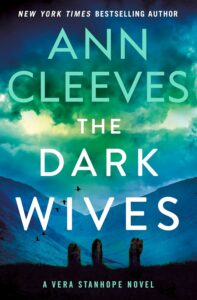Vera Stanhope #11
 This is the eleventh book in Cleeves’ now classic Vera Stanhope series, and as always, the books are a slow burn with a smasher of an ending. This book begins with an extremely compelling set up: Vera is called to a local care home where one of the workers has been found murdered and one of the residents, a 14 year old girl, has vanished. Vera and her team aren’t sure whether she’s a suspect or a victim, but she’s 14 and missing, so the hunt is on to locate her. Vera is under a bit of a cloud – at the end of the last book (The Rising Tide) she’d lost one of her team, Holly. She’s hired a replacement for the strait-laced, disciplined Holly that’s as different as she can be. Rosie Bell is brash and likes a drink with the girls after work, but she proves to have some unexpected qualities as the investigation proceeds.
This is the eleventh book in Cleeves’ now classic Vera Stanhope series, and as always, the books are a slow burn with a smasher of an ending. This book begins with an extremely compelling set up: Vera is called to a local care home where one of the workers has been found murdered and one of the residents, a 14 year old girl, has vanished. Vera and her team aren’t sure whether she’s a suspect or a victim, but she’s 14 and missing, so the hunt is on to locate her. Vera is under a bit of a cloud – at the end of the last book (The Rising Tide) she’d lost one of her team, Holly. She’s hired a replacement for the strait-laced, disciplined Holly that’s as different as she can be. Rosie Bell is brash and likes a drink with the girls after work, but she proves to have some unexpected qualities as the investigation proceeds.
With a new person on the team, all of whom miss Holly, there are some adjustments to be made, though Joe is as sturdy as always, and Charlie as good at following a paper trail in the background. Vera is such an interesting character and it’s one of the things that makes this series so great. She’s practical, but she’s also empathic. She acts like the investigation must proceed at all costs, yet she sees and understands the human pain behind the crimes she’s investigating. All through the book, Vera is unable to think of 14-year-old Chloe as a murderer, even if the evidence against her looks bleak and her team are sure she’s involved. However, Vera holds the team, and the book, together. The assembling of clues is meticulous and leads the detectives on some interesting tangents.
Rosie manages to prove her worth straight away as she deals with the death notification – the dead care worker’s parents are stunned with grief and despair, and Rosie turns out to have a light and sensitive touch. While Vera warns her she’s not a social worker but a cop, she also wants to use this particular skill of Rosie’s, and she indeed is able to earn the trust of the dead man’s parents. The grim nature of the care home, one for difficult adolescents, seems exemplified by dismal shades of grey, inside and out. Chloe, the missing girl, has an absent father and had been caring for a mentally ill mother. She wouldn’t live with her grandparents and so ended up in the home. The other residents have even harder lives in many ways and Chloe is somewhat of a loner, spending her time writing in her journal.
The other residents are more typically troubled. While Cleeves doesn’t delve into their lives quite as deeply as she does Chloe’s, she certainly paints a skillful picture of the bleakness of the home, which is run by a private company and seems to Vera to be coldly institutional rather than a “home” of any kind. As often is the case in a Cleeves novel, there are many threads and a seemingly unsolvable puzzle which sizzles and sparks as the book draws to a close.
Cleeves never neglects the natural side of things and the Dark Wives of the title are a Stonehenge like rock formation, with the folklore being that they were three crones told to keep quiet. They loom over the tiny nearby town, and the town in turn celebrates a witch night a few weeks after Halloween where the local kids dress up and go out on the moor to find the witch. It’s a huge local celebration, and the culmination of the book’s events. This was an atmospheric and emotional read, though I wished for more metaphorical flesh on Chloe. I wanted to know a bit more about her and despite a spectacular conclusion I was slightly disappointed. I almost felt this was a transitional title, as Vera adjusts to the loss of Holly and attempts to reboot her investigative team with the addition of Rosie. I’ll be interested to see what happens next. — Robin Agnew